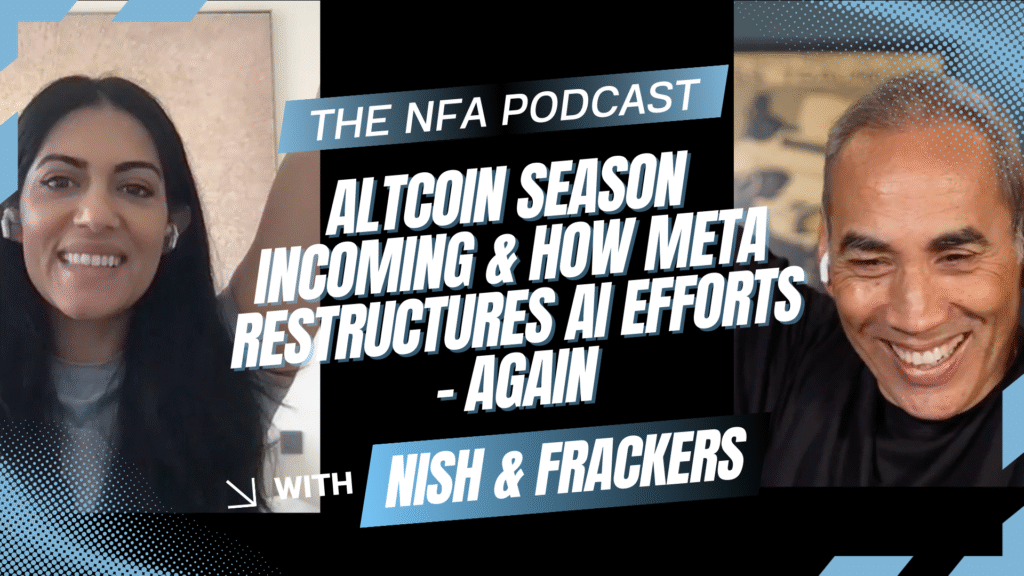
Dr. Nisheta Sachdev and Michiel Frackers are back from their summer vacation! No, not together and actually, they didn’t really have a vacation but they were swamped getting ready for the Tracer Initial Exchange Offering (IEO). More on that later, but for now, please enjoy episode 25 of the NFA Podcast where Nish and Frackers are thrilled about the imminent altcoin season and not so much about Mark Zuckerberg’s AI efforts…
Episode Summary
In this week’s NFA Podcast, Nish and Frackers cover the biggest tech and crypto stories shaping the markets. The discussion starts with macro forces driving crypto, including ETF inflows and interest rates, and how these overshadow internal crypto news. They unpack the classic cycle of Bitcoin ATH, Ethereum surge, and the coming of altcoin season, with dominance and fear and greed indices painting a mixed picture.
The hosts then dissect Meta’s fourth AI restructuring in six months. They critique Mark Zuckerberg’s buy-versus-build track record and ask whether Meta can produce AI products that are more than bolt-on features. They also highlight how consumer awareness and competition from platforms like Telegram and TikTok could challenge Meta’s dominance.
Other stories include Thailand allowing tourists to convert crypto into Thai baht to boost tourism, new hardware wallet recovery models to replace vulnerable seed phrases, and Blue Origin accepting crypto (but converting to USDT immediately). The US government’s $6M reward for information on Garantex, a Russian crypto exchange used for illicit activity, rounds out the news.
Finally, Nish and Michiel update listeners on their trading competition. Both portfolios are at $128 after a tough week, with Pudgy Penguins dragging Michiel down and meme coin A$$DAQ giving Nish some excitement. Solana, Broadcom, and Nvidia continue to show strength, proving that AI remains the strongest market driver.
Chapter List
· 00:00 Intro and episode overview
· 01:07 Macro vs crypto drivers
· 02:30 Altcoin season signals
· 04:02 Meta’s AI restructuring
· 05:11 Zuckerberg’s business model critique
· 07:00 Competition and consumer shifts
· 08:03 Thailand’s crypto tourism plan
· 09:16 Seed phrase security and new wallet models
· 10:54 Blue Origin accepts crypto for space flights
· 12:03 US reward for Garantex information
· 13:08 Market update and predictions
· 14:42 Altcoin season indicators and XRP signals
· 16:01 Fear and greed vs altcoin index
· 17:01 Trading competition update
· 18:03 Pudgy Penguins loss and AI stock strength
· 19:37 Meme coin A$$DAQ explained
Keywords
NFA Podcast, crypto, altcoin season, Bitcoin, Ethereum, XRP, BNB, AI, Meta, Mark Zuckerberg, Blue Origin, Jeff Bezos, Thailand crypto, tourism, seed phrases, Rider wallet, Pudgy Penguins, Solana, Nvidia, Broadcom, A$$DAQ, Garantex, crypto trading competition
Q&A Section
Q: What signals suggest altcoin season is starting?
A: Bitcoin and Ethereum have hit highs, typically followed by alts moving. Market dominance is shifting but indices show a transition phase.
Q: Why does Meta keep restructuring its AI division?
A: Zuckerberg has hired many researchers and acquired startups, but struggles to integrate them into a coherent business strategy.
Q: How is Thailand using crypto to boost tourism?
A: The government is allowing tourists to exchange crypto into Thai baht for 18 months as a pilot program.
Q: What’s the issue with seed phrases?
A: They remain a massive vulnerability. New models like Rider wallet use backup tags and multi-friend recovery.
Q: Is Blue Origin really accepting crypto?
A: Yes, but payments are converted immediately into USDT, raising questions about whether it’s genuine adoption or just PR.
Q: How did the trading competition go this week?
A: Both Nish and Michiel ended at $128 after losses across the board. Pudgy Penguins dragged Michiel’s portfolio down while A$$DAQ provided volatility for Nish.





